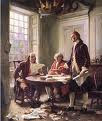
A review of George C. Herring's From Colony to Superpower: U.S. Foreign Relations Since 1776 (2008)
Part of the Oxford History of the United States Series
(Rating 5 of 5)
Before reading this book I had read a series of history books in order to experience a march through the ages of American history. From Colony to Superpower is a march through the ages all by itself, exploring not only how America developed as a nation but also how, throughout its existence, dealt with its brother and sister nations of the world. The book begins with Thomas Paine and finishes with the Administration of George W. Bush.
In Herring's work the reader sees America as a mixture of idealism and realpolitik. Physically, America was formed as the foreign policy of another nation, Great Britain. However, in a very real sense America was born of an idea. An idea that was illustrated beautifully by Thomas Paine in Common Sense in which he proclaimed that we have the opportunity to start the world anew. That idea that was made official when Thomas Jefferson, with some edits from Ben Franklin, produced the Declaration of Independence in which they proclaimed not only their own independence but laid down what they thought were the rights of all mankind. The only major republic in a world dominated by monarchies, this idea could be heard in Abraham Lincoln's Gettysburg Address and a half century later when Woodrow Wilson asked Americans to make the world safe for democracy. Yet, even when American leaders were idealistic at their best they could lay down their dogma and be extremely practical. Whether it was John Quincy Adams writing the Monroe Doctrine or Ronald Reagan deciding to cooperate with Gorbachev, idealism had to be meet with practical reality.

(Thomas Paine, author of Common Sense)

(Writing the Declaration)
One of the common themes of this book is that isolationism is a myth invented by twentieth century politicians. The United States was always active in the world around it. Our most famous documents, such as, the Declaration of Independence, the Emancipation Proclamation, and the Constitution itself were statements from the United States of America to the world of our intentions. Herring points out in this book that every American generation had at least one war. Instead of isolationism America had engaged primarily in unilateralism, acting own its own accord doing what it thinks is best. Unilateralism served the United States well in its early days and up to the start of the twentieth century. President George W. Bush would try bring back unilateralism, but that would lead only to debt and disaster.

(Although not known for being a great president, John Quincy Adams, ranks as one of the greatest secretaries of state we ever had)

(The Great White Fleet showed America to be a rising world power in the time of President Theodore Roosevelt)
Herring also discusses a lot of the negative aspects of U.S. foreign policy. The book explains some of the crazy filibustering that went on in the antebellum era, especially in the 1850s. Herring also covers a good deal about ‘blowback’ the price America pays for some of its foreign policy choices. An example of blowback is the United States' negative reputation in a great deal of Latin America due to choice alliances that we made during the Cold War. What can seem like a good and particle decision at the time can come back with deadly consequences.

(America as won of the two superpowers as MacArthur accepts Japan's surrender)

(Henry Kissinger, one of the leading architects of late twentieth century foreign policy)
Herring is extremely fair with almost all the actors in the history of American foreign policy. He treats Democrats, Republicans, liberals, conservatives, idealists, and realists the same. When evaluating them if he thinks they deserve praise he gives it and when he is critical of certain actions he writes about what they did wrong and could have done better. The end he concludes that America has to continue to remain engaged in the world it will need to act more respectful.

(Reagan and Gorbachev toward the end of the Cold War)
“Even if in decline, the United States will remain a crucial player in world affairs, and in coping with the challenges of a new and complex era the nation has a rich foreign policy tradition to draw on: the pragmatism of the peacemakers of the American Revolution; the basic realism of George Washington, Alexander Hamilton, and John Adams; the practical idealism of Thomas Jefferson and Abraham Lincoln; the worldliness and diplomatic skill of John Quincy Adams; the remarkable cultural sensitivity of diplomats such as Townsend Harris and Dwight Morrow; the commitment to public service of Elihu Root and Henry Stimson; the noble aspirations for a better world espoused by Woodrow Wilson; the intuitive understanding of the way diplomacy works—and its limitations—and the 'world point of view' manifested by Franklin Roosevelt in World War II; the coalition-building of Dean Acheson and the Wise Men of the Truman years and the George H.W. Bush administration during the first Gulf War; the strategic vision of Richard Nixon and Henry Kissinger; the ability to adapt and adjust displayed by Ronald Reagan; the efforts of the countless men and women who sought to share with other peoples the best of their country and to educate their fellow citizens about the world.”(p.963)
I also want to mention that on a technical note I love the footnotes at the bottom of the page as opposed to the end of the book or chapter. This way I do not have to flip back and forth while I am reading the book.
In the end I highly recommend this book to anyone who is interested in history or foreign policy. It is at times tough to get through seeing that it is over nine hundred pages, however, it is well worth the effort.





















































